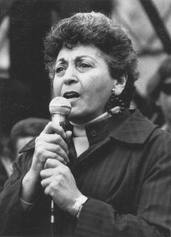
The Fourth International (FI) is a revolutionary socialist international organization consisting of followers of Leon Trotsky, also known as Trotskyists, whose declared goal is the overthrowing of global capitalism and the establishment of world socialism via international revolution. The Fourth International was established in France in 1938, as Trotsky and his supporters, having been expelled from the Soviet Union, considered the Communist International as effectively puppets of Stalinism and thus incapable of leading the international working class to political power. Thus, Trotskyists founded their own competing Fourth International.

The Freedom Socialist Party is a left-wing socialist political party with a revolutionary feminist philosophy based in the United States. It views the struggles of women and minorities as part of the struggle of the working class. It emerged from a split in the United States Socialist Workers Party in 1966. The party's Seattle branch, with support from individuals in other cities, split off from the SWP over what it described as the SWP's entrenched opportunism and undemocratic methods. The party has branches and members in the United States, as well as Australia, England, Germany and New Zealand. The current National Secretary of the FSP is Doug Barnes.
The League for Socialist Action was a Trotskyist organization in Canada. It was known by several names throughout its history, including the International Left Opposition (Trotskyist) of Canada, the Workers Party of Canada, the Socialist Policy Group, the Socialist Workers League, the Revolutionary Workers Party, The Club, the Socialist Education League and the Socialist Information Centre.
James Robertson (1928–2019) was the long-time and founding National Chairman of the Spartacist League (US), the original national section of the International Communist League. In his later years, Robertson was consultative member of the ICL's international executive committee.
The Socialist Union of America, also called American Socialist Union, Socialist Union or Cochranites were a Trotskyist group that split from the Socialist Workers Party in 1953 and disbanded in 1959. It included most of the SWPs trade union base, as well as others sympathetic to the "Pabloist" line of the International Secretariat of the Fourth International, though it was never recognized as a section of the ISFI.

Clara Fraser was a socialist feminist political organizer, who co-founded and led the Freedom Socialist Party and Radical Women.
Richard S. Fraser was an American Trotskyist and the principal theoretician of the doctrine of revolutionary integrationism in the 1950s within the Socialist Workers Party (US), against George Breitman's advocacy of support for black nationalism. He joined the Trotskyist movement in 1934, and was a founding member of the Socialist Workers Party (SWP) in the US. He made a study of the black question in the late 1940s, after the Party began to lose hundreds of black recruits. This was due not only to the rise of McCarthyist repression of the SWP, but also, of the party's burgeoning opportunism on the question of black nationalism. Informally, the leadership had even begun discouraging white and black members from forming interracial couples.
The Trotskyist Organization of the United States was a small Trotskyist group active in the U.S. during the 1970s and 1980s. The group was founded by two dissident factions which had emerged at the Socialist Workers Party's 1971 convention.
Under a variety of names and within a number of organizations over at least 17 years, the group around Harry Turner, or Turnerites was a presence within Trotskyism in the United States.
The Internationalist Workers Party (Fourth International) was a Trotskyist group in the United States. It was the American affiliate of the Morenoist International Workers League (Fourth International). It was unique in that it was the first American Trotskyist organization whose membership came principally from the Hispanic demographic.
The Spark is a Trotskyist group in the United States aligned internationally with the Lutte Ouvrière tendency.
The Spartacist League is a Trotskyist political grouping which is the United States section of the International Communist League, formerly the International Spartacist Tendency. This Spartacist League named themselves after the original Spartacus League of Weimar Republic in Germany, but has no formal descent from it. The League self-identifies as a "revolutionary communist" organization.
The Revolutionary Tendency within the American Socialist Workers Party was an internal faction that disagreed with the direction the leadership was taking the party on several important issues. Many groups and movements would have their roots in the RT, both in the United States and internationally, including the Socialist Equality Party and the world Spartacist and LaRouche movements and their various splinters.
The International Committee of the Fourth International (ICFI) is the name of two Trotskyist internationals; one with sections named Socialist Equality Party which publishes the World Socialist Web Site, and another linked to the Workers Revolutionary Party in the UK.
The Fourth International (FI), founded in 1938, is a Trotskyist international. In 1963, following a ten-year schism, the majorities of the two public factions of the Fourth International, the International Secretariat and the International Committee, reunited, electing a United Secretariat of the Fourth International. In 2003, the United Secretariat was replaced by an Executive Bureau and an International Committee, although some other Trotskyists still refer to the organisation as the USFI or USec.
The International Communist League (Fourth Internationalist), earlier known as the International Spartacist tendency is a Trotskyist international. Its largest constituent party is the Spartacist League (US). There are smaller sections of the ICL (FI) in Mexico, Canada, France, Germany, Ireland, Italy, Japan, South Africa, Australia, Greece and the United Kingdom.

The International Socialist Organization (ISO) was a Trotskyist group active primarily on college campuses in the United States that was founded in 1976 and dissolved in 2019. The organization held Leninist positions on imperialism and the role of a vanguard party. However, it did not believe that necessary conditions for a revolutionary party in the United States were met; ISO believed that it was preparing the ground for such a party. The organization held a Trotskyist critique of nominally socialist states, which it considered class societies. In contrast, the organization advocated the tradition of "socialism from below." as articulated by Hal Draper. Initially founded as a section of the International Socialist Tendency (IST), it was strongly influenced by the perspectives of Draper and Tony Cliff of the British Socialist Workers Party. It broke from the IST in 2001, but continued to exist as an independent organization for the next eighteen years. The organization advocated independence from the U.S. two-party system and sometimes supported electoral strategies by outside parties, especially the Green Party of the United States.
Michel Pablo was the pseudonym of Michalis N. Raptis, a Trotskyist leader of Greek origin.

The Workers World Party (WWP) is a revolutionary Marxist–Leninist communist party founded in 1959 by a group led by Sam Marcy of the Socialist Workers Party (SWP). Marcy and his followers split from the SWP in 1958 over a series of long-standing differences, among them their support for Henry A. Wallace's Progressive Party in 1948, their view of People's Republic of China as a workers' state, and their defense of the 1956 Soviet intervention in Hungary, some of which the SWP opposed.
The Socialist Workers Party (SWP) is a Trotskyist party in the United States. Originally a group in the Communist Party USA that supported Leon Trotsky against Soviet leader Joseph Stalin, it places a priority on "solidarity work" to aid strikes and is strongly supportive of Cuba. The SWP publishes The Militant, a weekly newspaper that dates back to 1928. It also maintains Pathfinder Press.





